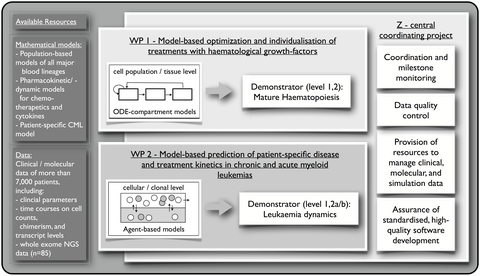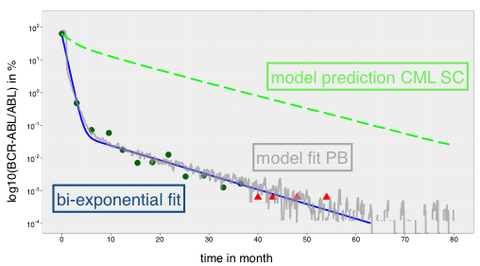BMBF e:Med HaematoOPT "Model-based optimisation and individualisation of treatment strategies in haematology"
Model-based optimization and individualization of treatment strategies in hematology
The interdisciplinary consortium HaematoOPT unites mathematicians, statisticians and bioinformaticians with partners of leading study groups, physicians and biologists. This cooperation aims to demonstrate on selected examples that it is useful and possible to utilise existing mathematical models of physiological and pathophysiological processes in clinical decision-making processes. In this way, we hope to contribute to the optimisation of therapy strategies by implementing techniques from the area of systems medicine.
The HaematoOPT consortium is part of the e:Med initiative of the Federal Ministry of Education and Research (BMBF).
The collaborative project is coordinated by Prof. Dr. Ingo Roeder at the Institut für Medizinische Informatik und Biometrie at the Technische Universität Dresden (TUD). Other institutions involved in the project are the Universitätsklinikum Carl Gustav Carus Dresden, MK I (UKD), the Universität Leipzig, IMISE (UL), the Universitätsklinikum Jena (UKJ), the Universitätsklinikum Köln (UKK) as well as the Fritz-Lipmann-Institut in Jena (FLI).
The BMBF-funded HaematoOPT project aims to demonstrate that models of normal and leukemic hematopoiesis can be used to practically impact clinical decision making. We are building this project on the shoulders of models of the major three hematopoietic cell lineages (i.e. erythropoiesis, granulocytopoiesis, thrompopoiesis and their regulatory growth factors) and on models for hematopoietic stem cells used to describe clonal cell expansion and, based hereon, onset and treatment of clonal diseases, such as chronic myeloid leukemia (CML). Our interdisciplinary consortium brings together mathematical modelers and bioinformaticians with clinical hematologists and biologists. It is our overall objective to demonstrate the clinical potential of the previously developed mathematical models for treatment optimization and individualization in the field of hematology.
The central objective of this project is to demonstrate that recently developed dynamic mathematical models of normal and leukemic haematopoiesis can be used to practically impact clinical decision- making. The project is based on mathematical models of the three major haematopoietic cell lineages (i.e. erythropoiesis, granulocytopoiesis, thrombopoiesis) and their regulation by growth factors as well as on models of haematopoietic stem cells. These models have successfully been applied to describe healthy and disturbed haematopoiesis including clonal cell expansion and, based hereon, onset and treatment of clonal diseases, such as chronic myeloid leukaemia (CML). The models have been developed and consolidated in cooperation with basic research partners and clinical trial groups over the last 10 years and can now be considered mature enough to be applied to clinical decision-making. This process clearly includes both, continuous further development and adaptation of the models to new biological insights. In particular, the models will explicitly account for patient heterogeneity, which allows us to make clinically relevant predictions regarding optimised treatment in dependence on individual factors.
The proposed interdisciplinary consortium brings together mathematical modellers and bioinformaticians with clinical haematologists and biologists. We build on a number of already long-standing and very successful collaborations of several of the participants. Consortium members have already demonstrated that model-based design of clinical trials on lymphoma and leukaemia treatments can result in improved therapy outcomes. Several partners are responsible for internationally leading clinical trial groups, a fact that allows our consortium to obtain data from these trials and to initiate novel clinical trials, investigating model-based predictions.
Based on these very good structural preconditions, we plan to extend and work up the existing models so that their clinical value and practical application can be demonstrated concretely. Furthermore, we want to implement the modelling and model validation in a way that allows a subsequent development of certified software products.
Coordination: Prof. Dr. Ingo Roeder, Institut für medizinische Informatik und Biometrie, Technische Universität Dresden, Germany
Vice Coordinator: Prof. Dr. Markus Loeffler, Institut für medizinische Informatik, Statistik und Epidemiologie, Universität Leipzig
Herein, we will focus on two major fields of interest:
- Optimizing growth factor treatment of perturbed normal hematopoiesis and
- Optimizing leukemia treatment in acute and chronic myeloid leukemia.
Subprojects
- Subproject 1 deals with the modelling of disturbed but haematologically normal haematopoiesis. In particular, we will look at chemotherapy-induced neutropenia, anaemia and thrombocytopenia
- The aim of the subproject 2 is the usage and further development of disease and treatment models in the context of leukaemia
- The central project Z is a consortium-spanning platform which supports the HaematoOPT partners
Involved scientists
- Christoph Baldow
-
Hendrik Liebscher
-
Sebastian Wagner
Publications
Funding
BMBF (031A424A) Funding within the e:Med Initiative -- Modul II - Demonstratoren für die individualisierte Medizin


